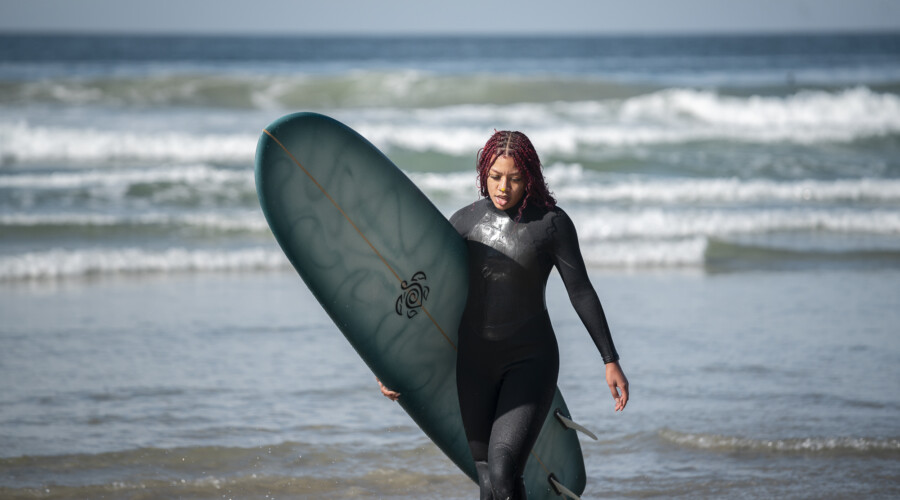Black Surf Week is a program of Black Like Water, it’s designed for undergraduate, graduate or transfer students from UCSD to get together to build community.
It takes place the week before school starts. Even though it only takes place once a year, you can see people that you surfed with throughout the year, and it feels like old friends that haven’t seen each other in a really long time. You have this comfortability with someone because you did something as crazy as surfing with them for the first time, and you build a level of trust with them.
With my Black Surf Week fam, I can talk about issues I have with my family at home — I trust them with my information, my wellbeing, my life.
When I first came to Black Surf Week, I was shy, I didn’t really know what to do, my self-confidence wasn’t the best. The first few days of the program, you’re not in the water, you’re meeting people and learning about what you’ll be doing in the water. The second day is pool day, we do a swim test, go over rules, study the ocean zones, learn the different rules, like the stingray shuffle. We learn what to do if you’re in distress, like if you hit your head.
And then, Wednesday, Thursday, Friday, we start surfing. I remember being out in the water and wanting to be out there forever. It’s so fun, because you can go the whole week without doing much, and then the last day you’re able to stand up. And it feels like that sense of accomplishment trumps everything that you felt before.
Every day before we surf, we do an intention circle, ‘I want to stand up today or I don’t want to fall off the board or I just want to have fun.’ Whatever people feel is their next achievable goal, we as a community will support them with that.
One day, Dr. Wayne approached me and told me Latifah was going to be graduating soon and wanted to know if I was interested in coming back the next year to replace her as a coordinator. And so, this past year, I coordinated the program for the second time, and that went really well.
Growing up, I always felt like something was missing, like a part of my identity. Growing up everywhere and moving around, I didn’t really know what it meant to be Black, and I didn’t know that that was something that I should be proud of. I was the only Black swimmer on my swim team in high school but coming here and seeing a huge Black aquatic community that I didn’t even know existed and being able to find common ground with people I’d never met, and to build these relationships, I have found my chosen family out here.
I am so grateful.
There’s a film that we’ve been showing for the past couple years, called Wade in the Water, and it goes over the history of Black surfing. Before Black people were brought over from Africa, they were in the water, they surfed often. And even when people were taken, they would escape by surfing. So we were always in the water, always a part of it, and it’s always been a part of us.
There are stereotypes about Black people not swimming or liking water, but it is racism that tries to keep us away. At some point, people didn’t even want to use the same bathroom and same water fountain. Like, ‘we don’t even want y’all to be in the ocean either,’ and you know, beach front properties or anything related to the beach is high end, expensive. Unfortunately, a lot of people who experience low income or poverty are Black and Brown folks so, even if they do live here, they don’t have the money to get from the city to the beach. Do they have a board or a wetsuit? Or do they even have the money to rent it?
It’s more about access but it is also about the dominant surfing community too. We’ve had surfers explain how they were surfing and people approached them to tell them they shouldn’t be out here, and that they needed to leave, and for no other reason, other than the color of their skin.
At Black Surf Week, we eliminate that, we come here, we set up our tent, we put our loud music, we have our food laid out. Everybody’s here laughing, having a good time. You know, you’ll see the water full of red and yellow rash guards from all our people out there.













